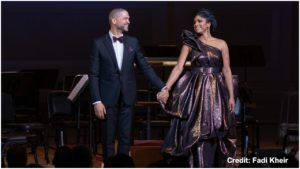
The Xen of Opera: The Citizenship of Performance
By Xenia HanusiakOpera, Song and Music Theater is quivering, twisting, and turning. Could it be that we are in an renaissance? There is a new blood pulsing through its veins. Opera and theater makers are pulling at its heart, resuscitating our interest and taking us to diverse locations with as yet unclassifiable languages and forms. The Xen of Opera looks at the protagonists and projects that are moving the needle of opera, song and music-theater. It is a monthly column that takes readers far and wide beyond the proscenium arch and writes about the influencers who are rewriting new narrative across the globe. There is no prescription to its content: sometimes a snap shot, sometimes an idea, sometimes an observation, but always the song.
We are becoming inured by violence, injustice and inequity. We hear the stories on our news channels but we no longer tremble or weep. We find ourselves in a situation where politics and diplomacy is failing and partisan media is not breaking outside of its echo chamber. The need for diverse collectivity and communion escalates.
Acts of creativity are stepping in–recording injustices, underscoring the unbridgeable gaps, and documenting historical paths that have led us to this moment of reckoning. Valuable new creativity for its own sake offers another, different and necessary panacea.
But creativity is an act of courage. Born in isolation, creativity requires a citizenship to bring the artistic vision and its messages to receptions that harbor diversity. The citizenship of performance –institutional patronage and the recognition of a non-hierarchical thoroughfare for low art -high art and parity is a vital need in our cultural landscape.
History serves. There would be no Sistine Chapel without the persistence of Pope Julius. Jean Sibelius was one of the first composers to prosper from institutional patronage. In 1898, the Finish government awarded Sibelius with a 10-year grant to compose music.
When institutions step in, take a detour or embrace new paths, they become active protagonists not only for the future, but their own future and posterity. Posterity has never been calibrated or documented for its inertia. On the one hand, institutions have the opportunity to reflect the urgent stories of our lives and on the other to accelerate and foster the artistic discoveries of human invention. Vision and economies of scale vary but at its most elemental the gesture is at the heart of collective cultural citizenship.
There is a movement in progress awakening, and during the past month I came across gestures and invitations that have enabled shifts to occur.
Carnegie Hall opened its doors illustriously over the past month for its Migrations Festival diversifying and sharing its curatorial stages. On March 30, the festival opened its Isaac Stern Auditorium to power couple jazz pianist-composer Jason Moran and mezzo-soprano Alicia Hall Moran, two artists who are taking their missions in music spectacularly across multiple and fertile directions.
Their production, “Two Wings: The Music of Black America in Migration” framed by Isabel Wilkerson’s groundbreaking book “The Warmth of the Sun” told the story of the Great Migration through a veritable pageant of music celebrating the contributions of African Americans.
Earlier in the month as part of Carnegie’s Create Justice program longtime collaborators composer-violinist Daniel Bernard Roumain and spoken word artist Marc Bamuthi Joseph, together with street dancer Drew Dollaz and singer Somi devised “Just and the Blind,” created a multi-media work exploring racial profiling.
Both performances are time capsules of the stories of lives we hear across the new cycles we listen to but do not feel. Recording and contextualizing experiences through performance is a ritualistic occasion, offering a perspective of the other that allows the shared felt experience. In the careful and illumined hands of these generous and brave creators neither performances condemned nor protested, but rather quickened the hearts and consciences of those who attended with music.
The generous act can be a simple gesture – an invitation – a quiet act that ripples, an act whose effect activates an effect greater than its intention.
Since its first season in 1988 New York Festivals of Song (NYFOS) has lived by its motto “no song is safe from us.” The purview of the company has to a greater extent relied on the traditional notion of western art song and its traditional accompaniments.
This month and by its own admission of an experiment, NYFOS opened its doors to unexplored territory: a program of song reformatted electro-acoustic settings.
For this venture, musical directors Michael Barrett and Steven Blier invited soprano–composer Kate Soper to produce NYFOS Next: Kate Soper & Friends, a highly satisfying overview of compositions for female voice and electronics covering the pristine overtones of Alvin Lucier, the dexterous beauty of Kaija Saariaho, the intriguing and deserve to be heard more often music of Natacha Diels, improvisations care of Charmaine Lee and Sam Pluta, and works by Soper as composer and performer. NYFOS’s gesture may appear as insignificant in the grander scale but the gesture is a provocation that opens audiences to reconsider the meaning of song in the 21stcentury and reminds other institutions to take courageous steps.
This month The Shed opens its doors in multiple directions, creating confluences from contrariness, and promising a meeting place beyond boundaries. The vision vows us to experience what we see across our society, programming performances that act as catalysts in the understanding of ourselves. The thoroughfare approach is a complimentary extension to the current programming and each step reverts us forward to the history of performance as a ritualistic act.
Categories
Special Features

